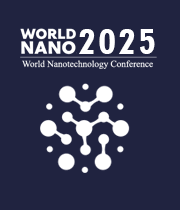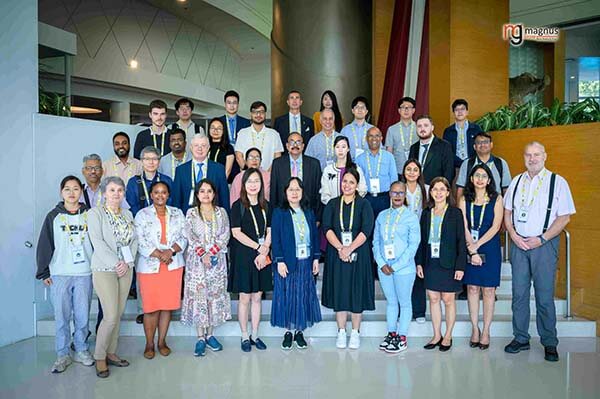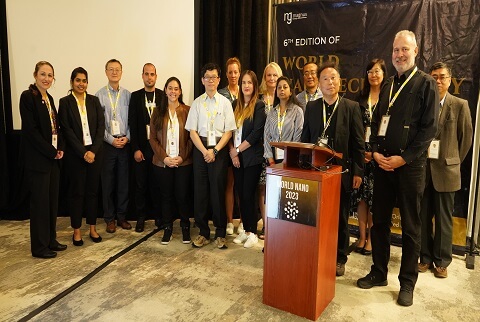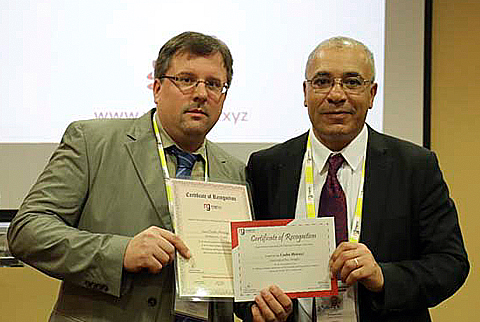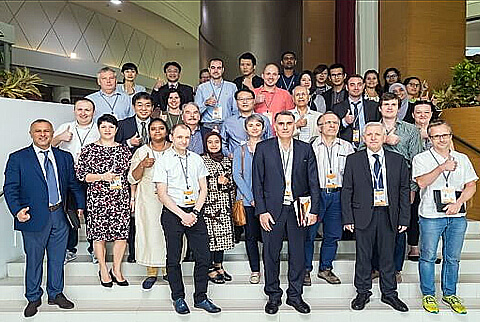About World Nano 2025 | Hybrid Event
Magnus Group is proud to invite brilliant minds to its prestigious “10th Edition of World Nanotechnology Conference” (WORLD NANO 2025) which will be hosted in a hybrid manner with online and onsite versions at Rome, Italy during March 10-12, 2025.
This HYBRID EVENT allows you to participate in person at Rome, Italy or Virtually from your home or work.
The theme chosen for this year is “Nanotechnology: Transcending All Limits by Retrospection of Advances”.
Nanoscience and nanotechnology are cross-disciplinary fields that have an impact on everything from smart coatings to electronic devices to medicine. We have created an agenda that incorporates nano-electronics and photonics, nanomaterials and nanofabrication, energy and sustainability, and biological sciences, among others, due to the transversal nature of Nanoscience. WORLD NANO 2025 is a scientific meeting that is intended to attract a large number of participants and listeners. We are putting together an amazing scientific programme, headed by world-renowned invited speakers, researchers, scientists, academicians, engineers, nanotechnologists, healthcare professionals, clinicians, pharmacists, toxicologists and industry spokesperson that will not only display exciting new breakthroughs in nanotechnology, but will also illustrate nanotechnology's transformative significance in a variety of physical and biological sciences.
We hope that the scientific programme, which covers a wide range of issues, meets your expectations, and that your participation in the congress allows you to network with colleagues, acquaintances, and recognised experts from across the world. Despite the difficult times we are experiencing, we are hopeful that the hybrid nature of WORLD NANO 2025 will provide an open venue for discussing all aspects of matter at the nanoscale, exchanging ideas, sparking collaborations, and forming new networks. We'll have outstanding keynote speakers, a fine Organizing Committee that will assist you before and during the event, and the Scientific Committee is working on putting together an interesting schedule that will cover all of these fascinating elements of Nanoscience and Nanotechnology. Keynote speakers, oral presentations, poster sessions, discussion forums, and workshops are all part of the scientific gathering. This is a fantastic opportunity to present your research findings to a large audience, foster information sharing, and network in the field of Nanotechnology.
Recommended Conferences: Nanotechnology Conferences 2025 | Nanomaterials Conference 2025 | Nanomaterials Conferences | Nanoscience Conferences 2025 | Nano Event 2025
Past Conference Information
8th Edition of World Nanotechnology Conference Report:
The 8th Edition of World Nanotechnology Conference was successfully organized as a Hybrid Event on March 18-20, 2024, in Singapore and Virtually. The World Nano 2024 Congress received an overwhelming response from participants.
Magnus Group extends heartfelt thanks to all the Organizing Committee Members, Chairs, Speakers, Students, Media Partners, and everyone who supported the conference in every aspect, contributing to its magnificent success.
Recommended: Nanotechnology Conferences 2025 | Nanomaterials Conference 2025 | Nanomaterials Conferences | Nanoscience Conferences 2025 | Nanomaterials Meetings | Nanotechnology Symposium | Nanotechnology Events 2025 | Nanoscience Congress 2025 | Nanotechnology Meetings 2025 | Nanoscience Conference | Nanoscience Meetings | Nanomaterials Events | Nanoscience Events 2025 | Nano Science Meetings
World Nano 2024, as an esteemed international platform, has paved the way for extensive discussions on the latest innovations in Nanotechnology. Following the keynote session, a series of oral presentations commenced, featuring speakers from diverse backgrounds including universities, hospitals, academia, and businesses, who shared their recent research activities. Here's a glimpse of our distinguished speakers.
For World Nano 2024 Final Program: Click Here
For World Nano 2024 Abstract Book: Click Here
For World Nano 2024 Gallery: Click Here
Day-01 Keynote Presenters:
|
Thierry Mayer, EPFL, Switzerland |
|
Carmen Socaciu, BIODIATECH- Proplanta SRL, Romania |
Recommended: Nanotechnology Conferences 2025 | Nanomaterials Conference 2025 | Nanomaterials Conferences | Nanoscience Conferences 2025 | Nanomaterials Meetings | Nanotechnology Symposium | Nanotechnology Events 2025 | Nanoscience Congress 2025 | Nanotechnology Meetings 2025 | Nanoscience Conference | Nanoscience Meetings | Nanomaterials Events | Nanoscience Events 2025 | Nano Science Meetings
Day-01 Oral Presenters:
|
Etelka Chung, University of Hertfordshire, United Kingdom |
|
Antonio Pantano, University of Palermo, Italy |
|
Igor Reshetov, Sechenov University, Russian Federation |
|
Mohammad Al Mamun, University of Malaya, Malaysia |
|
Flora Maitim Yrad, Silliman University, Philippines |
|
Naoki Azuma, Nagoya University, Japan |
|
Tshireletso Madumo, University of Johannesburg, South Africa |
|
Yasuhiro Kimura, Nagoya University, Japan |
|
Ashita Anand, TERI Deakin Nanobiotechnology Centre, India |
Day-01 Poster Presenters:
|
Vishakha Goswami, Indian Institute of Technology Delhi, India |
|
Lu Zhou, University of Macau, China |
|
Cheng Jung Yao, National Taiwan University, Taiwan |
Recommended: Nanotechnology Conferences 2025 | Nanomaterials Conference 2025 | Nanomaterials Conferences | Nanoscience Conferences 2025 | Nanomaterials Meetings | Nanotechnology Symposium | Nanotechnology Events 2025 | Nanoscience Congress 2025 | Nanotechnology Meetings 2025 | Nanoscience Conference | Nanoscience Meetings | Nanomaterials Events | Nanoscience Events 2025 | Nano Science Meetings
Day-02 Keynote presenters:
|
Paulo Cesar De Morais, Catholic University of Brasilia, Brazil |
|
Kyoungtae Kim, Missouri State University, United States |
|
Thomas J Webster, Hebei University of Technology, China |
Day-02 Oral presenters:
|
Charles Ivan Salanga, Saint Louis University, Philippines |
|
Vasyl G. Kravets, The University of Manchester, United Kingdom |
|
Aleksandr Ya. Khavkin, Lomonosov Moscow State University, Russian Federation |
|
Laura Elena Mureşan, Babes-Bolyai University, Romania |
|
Teresa Ben Fernandez, University of Cadiz, Spain |
|
Shagufta Bi, IFTM University Moradabad, India |
|
Arvind K Gathania, National Institute of Technology Hamirpur, India |
|
A B M Sharif Hossain, Imam Mohammad Ibn Saud Islamic University, Saudi Arabia |
|
Ayad Al Thuwaynee, Babylon University, Iraq |
|
Katekani Shingange, Mintek, South Africa |
|
Vladimir Chigrinov, University of, Science and Technology, Hong Kong |
|
Raymond C Jagessar, University of Guyana, Guyana |
|
Eknath Kole, Kavayitri Bahinabai Chaudhari North Maharashtra University Jalgaon, India |
Day-02 Poster Presenters:
|
Lipin Ge, The University of Sydney, Australia |
|
Anurag Kumar Pandey, IT Kharagpur, India |
Recommended: Nanotechnology Conferences 2025 | Nanomaterials Conference 2025 | Nanomaterials Conferences | Nanoscience Conferences 2025 | Nanomaterials Meetings | Nanotechnology Symposium | Nanotechnology Events 2025 | Nanoscience Congress 2025 | Nanotechnology Meetings 2025 | Nanoscience Conference | Nanoscience Meetings | Nanomaterials Events | Nanoscience Events 2025 | Nano Science Meetings
Day-03 Keynote presenters:
|
Antonio Vassallo, University of Basilicata, Italy |
Day-03 Oral presenters:
|
Lianjie Zhu, Tianjin University of Technology, China |
|
Shinyoung Lee, Chungnam National University, Korea, Republic Of |
|
Yurim Lee, Chungnam National University, Korea, Republic Of |
|
Jiang Xu, Virogin Biotech, China |
|
Jinshun Bi, Chinese Academy of Sciences, China |
|
Likhi Dhru, Indian Institute of Technology Indore, India |
|
Ncediwe Tsolekile, Cape Peninsula University of Technology, South Africa |
Recommended: Nanotechnology Conferences 2025 | Nanomaterials Conference 2025 | Nanomaterials Conferences | Nanoscience Conferences 2025 | Nanomaterials Meetings | Nanotechnology Symposium | Nanotechnology Events 2025 | Nanoscience Congress 2025 | Nanotechnology Meetings 2025 | Nanoscience Conference | Nanoscience Meetings | Nanomaterials Events | Nanoscience Events 2025 | Nano Science Meetings
Thank you all
Upcoming Nanotechnology Conferences
Conference Name: 9th Edition of World Nanotechnology Conference
Dates: October 28-30, 2024
Venue: Baltimore, MD, USA
Conference Name:10th Edition of World Nanotechnology Conference
Dates: March 10-12, 2025
Venue: Rome, Italy
Upcoming Materials Conferences
Conference Name: 7th Edition of International Conference on Materials Science and Engineering
Dates: October 28-30, 2024
Venue: Baltimore, MD, USA
Conference Name: 8th Edition of International Conference on Materials Science and Engineering
Dates: March 10-12, 2025
Venue: Rome, Italy
For Magnus Group Conferences Reviews:
Magnus Group Nanotechnology Conferences Reviews | Magnus Conferences Reviews
Upcoming Nanotechnology Conferences:
|
Conferences |
Dates |
Venue |
|
March 18-20, 2024 |
||
|
October 28-30, 2024 |
||
|
March 10-12, 2025 |
6th Edition of World Nanotechnology Conference Report:
6th Edition of World Nanotechnology Conference was organized as Hybrid Event on April 24-26, 2023 at Orlando, USA and Virtually. World Nano 2023 Congress has received generous response from participants.
Magnus Group takes its pleasure to thank all the Organizing Committee Members, Chairs and Co-chairs, Speakers, Students, Media Partners and all who supported the conference in every aspect for the magnificent success.
Recommended: Nanotechnology Conferences 2025 | Nanomaterials Conference 2025 | Nanomaterials Conferences | Nanoscience Conferences 2025 | Nanomaterials Meetings | Nanotechnology Symposium | Nanotechnology Events 2025 | Nanoscience Congress 2025 | Nanotechnology Meetings 2025 | Nanoscience Conference | Nanoscience Meetings | Nanomaterials Events | Nanoscience Events 2025 | Nano Science Meetings
World Nano 2023 being an international platform, this scientific meeting has laid the path for discussing the latest innovations in the Nanotechnology. Followed by Keynote Session, Oral Presentations were initiated which included Speakers from various Universities, Hospitals, Academia and Business who shared their recent research activities. And here is the list of our speakers.
For World Nano 2023 Final Program: Click Here
For World Nano 2023 Abstract Book: Click Here
For World Nano 2023 Gallery: Click Here
Day 1 Keynote Presenters:
|
Thierry Meyer Ecole Polytechnique Federale de Lausanne, Switzerland |
|
Thomas J Webster Hebei University of Technology, China |
|
Tetsuya Yamamoto Kochi University of Technology, Japan |
Recommended: Nanotechnology Conferences 2025 | Nanomaterials Conference 2025 | Nanomaterials Conferences | Nanoscience Conferences 2025 | Nanomaterials Meetings | Nanotechnology Symposium | Nanotechnology Events 2025 | Nanoscience Congress 2025 | Nanotechnology Meetings 2025 | Nanoscience Conference | Nanoscience Meetings | Nanomaterials Events | Nanoscience Events 2025 | Nano Science Meetings
Day 1 Oral Presenters:
|
Barbara Damasceno Rice University, United States |
|
Yongqiang Wang Los Alamos National Laboratory, United States |
|
Shubhangi Shukla North Carolina State University, United States |
|
Shubhangi Shukla North Carolina State University, United States |
|
Safia Abdullah R Alharbi University of Louisville, United States |
|
John Bang North Carolina Central University, United States |
|
Chunlei Wang Florida International University, United States |
|
Alaa Saed Abdelmagid Zailouk Ministry of Tourism and Antiquities, Egypt |
Day 1 Poster Presenters:
|
Srivalli Mukkavilli North Carolina Central University, United States |
|
Sarka Hradilova Czech Advanced Technology and Research Institute, Czech Republic |
|
Ludmila Zarska Czech Advanced Technology and Research Institute, Czech Republic |
Day-01 Oral presenters (Virtual):
|
Sadia Afrin Khan Food and Drug Administration, United States |
|
Delia Teresa Sponza Dokuz Eylul University, Turkey |
|
Sikirat Kehinde Sheu University of York, United Kingdom |
|
Ines Belhaj University of Lisbon, Portugal |
Recommended: Nanotechnology Conferences 2025 | Nanomaterials Conference 2025 | Nanomaterials Conferences | Nanoscience Conferences 2025 | Nanomaterials Meetings | Nanotechnology Symposium | Nanotechnology Events 2025 | Nanoscience Congress 2025 | Nanotechnology Meetings 2025 | Nanoscience Conference | Nanoscience Meetings | Nanomaterials Events | Nanoscience Events 2025 | Nano Science Meetings
Day-02 Keynote presenters
|
Marilena Carbone University of Rome “Tor Vergata”, Italy |
|
Xiao Hong Nancy Xu Old Dominion University, United States |
|
Purushottam Chakraborty Saha Institute of Nuclear Physics, India |
|
Subas Chandra Dinda The Neotia University, India |
|
Vladimir Chigrinov The Hong Kong University of Science and Technology, Hong Kong |
Day-02 Oral presenters
|
Raymond C Jagessar University of Guyana, Guyana |
|
Ishika Nag Seminole State College, United States |
|
Sungwook Jung Harvard Medical School, United States |
|
Oliwia Metryka University of Silesia, Poland |
|
Alvard Ter Karapetyan Vardanants Center for Innovative Medicine, Armenia |
|
Michael Tribelsky Lomonosov Moscow State University, Russian Federation |
|
Abhishek Ranade Indian Institute of Science, India |
|
Presenter 1: Mounamukhar Bhattacharjee ICMR Headquarters, India |
|
Presenter 2: Lopamudra Roy Apeejay Stya University, India |
|
Shubhangi Indian Institute of Technology (IIT BHU), India |
|
Laura Elena Muresan Babes-Bolyai University, Romania |
|
Liudmila Boldyreva National Research Nuclear University, Russian Federation |
|
Omolola Esther Fayemi North-West University, South Africa |
|
Sara Assi American University of Beirut, Lebanon |
|
Sharda Sundaram Sanjay Ewing Christian College, India |
|
Gunadhor Singh Okram UGC-DAE Consortium for Scientific Research, India |
|
Rehana Badar The University of Lahore, Pakistan |
Day-02 Poster presenters
|
Chukwudi S Ubah East Carolina University, United States |
|
Nina Ivanova Іnstitute of Dermatology and Venerology of National Medical Science of Ukraine, Ukraine |
Recommended: Nanotechnology Conferences 2025 | Nanomaterials Conference 2025 | Nanomaterials Conferences | Nanoscience Conferences 2025 | Nanomaterials Meetings | Nanotechnology Symposium | Nanotechnology Events 2025 | Nanoscience Congress 2025 | Nanotechnology Meetings 2025 | Nanoscience Conference | Nanoscience Meetings | Nanomaterials Events | Nanoscience Events 2025 | Nano Science Meetings
Thank you all
For Magnus Group Conferences Reviews:
Magnus Group Nanotechnology Conferences Reviews | Magnus Conferences Reviews
4th Edition of World Nanotechnology Conference Report:
The 4th Edition of the World Nanotechnology Conference was conducted as an Online Event from April 25-27, 2022. The World Nano 2022 Congress garnered an overwhelming response from participants.
Magnus Group expresses its gratitude to all the Organizing Committee Members, Chairs and Co-chairs, Speakers, Students, Media Partners, and everyone who contributed to the conference's success in every aspect. Thank you for making it a magnificent and successful event.
Recommended : Nanotechnology Conferences 2025 | Nanomaterials Conference 2025 | Nanomaterials Conferences | Nanoscience Conferences 2025 | Nanomaterials Meetings | Nanotechnology Symposium | Nanotechnology Events 2025 | Nanoscience Congress 2025 | Nanotechnology Meetings 2025 | Nanoscience Conference | Nanoscience Meetings | Nanomaterials Events | Nanoscience Events 2025 | Nano Science Meetings
World Nano 2022 being an international platform, this scientific meeting has laid the path for discussing the latest innovations in the Nanotechnology. Followed by Keynote Session, Oral Presentations were initiated which included Speakers from various Universities, Hospitals, Academia and Business who shared their recent research activities. And here is the list of our speakers.
For World Nano 2022 Final Program: Click Here
For World Nano 2022 Abstract Book: Click Here
Day 1 Keynote Presenters:
|
Petra Perner, FutureLab Artificial Intelligence IBaI-2, Germany |
|
Mindaugas Macernis, Vilnius University, Lithuania |
|
Alexander G. Ramm, Kansas State University, USA |
|
Raymond Compton Jagessar, University of Guyana, Guyana |
Recommended : Nanotechnology Conferences 2025 | Nanomaterials Conference 2025 | Nanomaterials Conferences | Nanoscience Conferences 2025 | Nanomaterials Meetings | Nanotechnology Symposium | Nanotechnology Events 2025 | Nanoscience Congress 2025 | Nanotechnology Meetings 2025 | Nanoscience Conference | Nanoscience Meetings | Nanomaterials Events | Nanoscience Events 2025 | Nano Science Meetings
Day 1 Oral Presenters:
|
Xing Wu, Commonwealth Scientific and Industrial Research Organisation(CSIRO), Australia |
|
Getachew Feyissa Gemeda, National Taiwan University of Science and Technology, Taiwan |
|
Safayet Ahmed, The Hong Kong Polytechnic University, Hong Kong |
|
Mohammad Al Mamun, University of Malaya, Malaysia |
|
Flora Maitim Yrad, Silliman University, Philippines |
|
Subas Chandra Dinda, Teerthanker Mahaveer Universit, India |
|
Gunadhor S. Okram, UGC-DAE Consortium for Scientific Research, India |
|
Ajith M P, Jawaharlal Nehru University, India |
|
Chandra Mohan, SBAS, K. R. Mangalam University, India |
|
Raghvendra Kumar Mishra, Amity Institute of Biotechnology, India |
|
Lamya M. Al Farsi, Sultan Qaboos Univesity, Oman |
|
Mauliady Satria, King Fahd University of Petroleum and Minerals (KFUPM), Saudi Arabia |
|
Mert Saraco Glu, Istanbul Technical University, Turkey |
|
Elena Lagreca, University of Naples Federico II, Italy |
|
Concetta Di Natale, University of Naples Federico II, Italy |
|
Raymond Compton Jagessar, University of Guyana, Guyana |
|
Regina Maria Chiechio, CNRS Universitè de Rennes 1, France |
|
Bongiwe Dhlamini, North-West University, South Africa |
|
Hugues Kamdem Paumo, North-West University, South Africa |
Day 2 Keynote Presenters:
|
Maros Halama, Technical University of Kosice, Slovakia |
|
Purushottam Chakraborty, Saha Institute of Nuclear Physics, India |
|
Ramesh K. Agarwal, Washington University in St. Louis, USA |
|
Kyoungtae Kim, Missouri State University, USA |
Day 2 Oral Presenters:
|
Fei Teng, Harbin Institute of Technology, China |
|
Boggarapu Nageswara Rao, Koneru Lakshmaiah Education Foundation, India |
|
Thomas Justel, FH Münster-University of Applied Sciences, Germany |
|
Shivani Dhall, D.A.V. college, India |
|
D. Nagasamy Venkatesh, JSS College of Pharmacy, India |
|
Arun Kumar Singh, Guru Ghasidas Vishwavidyalaya, India |
|
Igor Melnyk, National technical University of Ukraine, Ukraine |
|
Rosalind Volpe, Silver Nanotechnology Working Group, USA |
|
Mohamed Elmahi Mohamed Ahmed, University of Messina, Italy |
|
Lucia Catucci, University of Bari, Italy |
|
Laura Mais, University of Cagliari, Italy |
|
Bekir Fatih Kahraman, Zonguldak Bulent Ecevit University, Turkey |
|
Souhail Dhouib, University of Sfax, Tunisia |
|
Diogo M.F. Santos, Instituto Superior Técnico, Ulisboa, Portugal |
|
Ngnintedem Yonti Cedrik, University of Yaounde I, Cameroon |
|
Magdalena Gorska Ponikowska, Medical University of Gdansk, Poland |
|
Turkiya Mohammed Habib Al Shahumi, Sultan Qaboos University, Oman |
Recommended : Nanotechnology Conferences 2025 | Nanomaterials Conference 2025 | Nanomaterials Conferences | Nanoscience Conferences 2025 | Nanomaterials Meetings | Nanotechnology Symposium | Nanotechnology Events 2025 | Nanoscience Congress 2025 | Nanotechnology Meetings 2025 | Nanoscience Conference | Nanoscience Meetings | Nanomaterials Events | Nanoscience Events 2025 | Nano Science Meetings
Poster Presenters:
|
Sergey G. Lebedev, Institute for Nuclear Research RAS, Russian Federation |
|
Nina Ivanova, Іnstitute of dermatology and venerology of National Medical Science of Ukraine, Ukraine |
|
Mariya Aleksandrova, Technical University of Sofia, Bulgaria |
|
Rehana Badar, Superior University, Pakistan |
|
Ahmed Mortuza Saleque, The Hong Kong Polytechnic University, Hong Kong |
Day 3 Keynote Presenters:
|
Vladimir G. Chigrinov, Hong Kong University of Science and Technology, Hong Kong |
|
Simplice Koudjina, National University of Sciences, Technology, Engineering and Mathematics (UNSTIM), Benin |
|
Sergey Suchkov, Institute for Global Health, MGUPP, Russia |
Day 3 Oral Presenters:
|
M. A. Motalib Hossain, University of Malaya, Malaysia |
|
Hao Wu, Shandong University, China |
|
Vitaliy Grudtsov, Scientific-Manufacturing Complex Technological Centre, Russia |
|
Chandana Rath, Indian Institute of Technology (BHU), India |
|
Bashir M. Jarrar, Jerash university, Jordan |
|
Pragya Baghel, Columbia Institute of Pharmacy, India |
|
D. Nagasamy Venkatesh, JSS College of Pharmacy, India |
|
Sharda Sundaram Sanjay, Ewing Christian College, India |
|
Mohammad Owais, Aligarh Muslim University Aligarh, India |
|
Rosa Penalver Soler, University of Murcia, Spain |
|
Zafar Iqbal, Sarhad University Peshawar, Pakistan |
|
Luz Maria Rivera Rivera, Glasst Innovation Company, Colombia |
|
Eva Pinho, INIAV, I.P - National Institute for Agrarian and Veterinarian Research, Portugal |
|
Salvatore Petralia, University of Catania, Italy |
|
Jasim Mohammed Salman, Iraq University College, Iraq |
|
Katerina Emilova Lazarova, Bulgarian Academy of Sciences, Bulgaria |
|
Dibyendu Mondal, Institute of Plant Genetics of the Polish Academy of Sciences (IPG PAS), Poland |
|
Ayat F. Hashim, National Research Centre, Egypt |
|
Bahareh Khezri, University of Chemistry and Technology, Czech Republic |
|
Kanchan Chauhan, Universidad Nacional Autonoma de Mexico, Mexico |
Recommended : Nanotechnology Conferences 2025 | Nanomaterials Conference 2025 | Nanomaterials Conferences | Nanoscience Conferences 2025 | Nanomaterials Meetings | Nanotechnology Symposium | Nanotechnology Events 2025 | Nanoscience Congress 2025 | Nanotechnology Meetings 2025 | Nanoscience Conference | Nanoscience Meetings | Nanomaterials Events | Nanoscience Events 2025 | Nano Science Meetings
Thank you all
For Magnus Group Conferences Reviews:
Magnus Group Nanotechnology Conferences Reviews | Magnus Conferences Reviews
2021 World Nanotechnology Conference | Online Event Report:
Fully Virtual Event “World Nanotechnology Conference“ during April 19-20, 2021 was successful. The event was very well attended and the scientific program was high quality, we would like to thank all the speakers, delegates, and sponsors.
Recommended: Nanotechnology Conferences 2025 | Nanomaterials Conference 2025 | Nanomaterials Conferences | Nanoscience Conferences 2025 | Nanomaterials Meetings | Nanotechnology Symposium | Nanotechnology Events 2025 | Nanoscience Congress 2025 | Nanotechnology Meetings 2025 | Nanoscience Conference | Nanoscience Meetings | Nanomaterials Events | Nanoscience Events 2025 | Nano Science Meetings
Our special thanks to the moderators and chairs of the conference for their continued support.
For World Nano 2021 Final Program: Click Here
For World Nano 2021 Abstract Book: Click Here
Day 1 Keynote Presenters:
|
Marcos Lanzon, Polytechnic University of Cartagena, Spain |
|
Raymond Jagessar, University of Guyana, South America |
|
Soshu Kirihara, Osaka University, Japan |
|
Liqiu Wang, The University of Hong Kong, Hongkong |
|
Doina Elena Gavrila, University "Politehnica" Bucharest, Romania |
Recommended: Nanotechnology Conferences 2025 | Nanomaterials Conference 2025 | Nanomaterials Conferences | Nanoscience Conferences 2025 | Nanomaterials Meetings | Nanotechnology Symposium | Nanotechnology Events 2025 | Nanoscience Congress 2025 | Nanotechnology Meetings 2025 | Nanoscience Conference | Nanoscience Meetings | Nanomaterials Events | Nanoscience Events 2025 | Nano Science Meetings
Day 1 Oral Presenters:
|
Sadia Afrin Khan, US Food and Drug Administration, USA |
|
Donglu Shi, University of Cincinnati, USA |
|
Robert Buenker, University of Wuppertal, Germany |
|
Maria Usuga, Jean Monnet University, France |
|
Mario Khoury, Institut Matériaux Microélectronique Nanosciences de Provence, France |
|
Shazia Bano, Harvard Medical School, USA |
|
Chandra Mohan, K. R. Mangalam University, India |
|
Soumendra Darbar, Jadavpur University, India |
|
Ezequiel Coscueta, Universidade Católica Portuguesa, Portugal |
|
Khavkin Aleksander, UdSU and Russian State University of Oil and Gas, Russia |
Day 2 Keynote Presenters:
|
Meera Ramrakhiani, Rani Durgavati University, India |
|
Thomas Webster, Northeastern University, USA |
|
Germercy Paredes Guerrero, Pontificia Universidad Católica Madre y Maestra, France |
|
Giuseppe Pellicane, UKZN And Universita’ Degli Studi Di Messina, South Africa |
Day 2 Oral Presenters:
|
Huiyao Wang, New Mexico State University, United States |
|
Arnaud Valour, Jean Monnet University, France |
|
T.N.V.K.V.Prasad, Acharya N G Ranga Agricultural University, India |
|
Abbaraju Krishna Sailaja, RBVRR Women’s College of Pharmacy, India |
|
Lamya Al Farsi, Sultan Qaboos University, Oman |
|
Seongwoo Woo, Addis Ababa Science & Technology University, Ethiopia |
|
Syed Ali Junaid Alam, National University of Science and Technology MISiS, Russia |
|
Fábio Figueiras, Instituto de Nanociência e Nanotecnologia, Portugal |
Recommended: Nanotechnology Conferences 2025 | Nanomaterials Conference 2025 | Nanomaterials Conferences | Nanoscience Conferences 2025 | Nanomaterials Meetings | Nanotechnology Symposium | Nanotechnology Events 2025 | Nanoscience Congress 2025 | Nanotechnology Meetings 2025 | Nanoscience Conference | Nanoscience Meetings | Nanomaterials Events | Nanoscience Events 2025 | Nano Science Meetings
Poster Presenters:
|
Karel Havlicek, Technical University of Liberec, Czech |
|
Magda Nechanicka, Technical University of Liberec, Czech Republic |
|
Elena Ershova, Khanty-Mansiysk clinical TB dispensary, Russian Federation |
Recommended: Nanotechnology Conferences 2025 | Nanomaterials Conference 2025 | Nanomaterials Conferences | Nanoscience Conferences 2025 | Nanomaterials Meetings | Nanotechnology Symposium | Nanotechnology Events 2025 | Nanoscience Congress 2025 | Nanotechnology Meetings 2025 | Nanoscience Conference | Nanoscience Meetings | Nanomaterials Events | Nanoscience Events 2025 | Nano Science Meetings
Thank you all
For Magnus Group Conferences Reviews:
Magnus Group Nanotechnology Conferences Reviews | Magnus Conferences Reviews
2020 World Nanotechnology Conference | Online Event Report:
In 2020 Magnus Group Successfully completed Online Event “World Nanotechnology Conference“ during October 20-21, 2020. In view of the coronavirus pandemic, the conference is fully converted to a fully Virtual Event.
We would like to thank all the speakers, delegates, and sponsors for your continued support and patience in successfully completing this conference.
Recommended: Nanotechnology Conferences 2025 | Nanomaterials Conference 2025 | Nanomaterials Conferences | Nanoscience Conferences 2025 | Nanomaterials Meetings | Nanotechnology Symposium | Nanotechnology Events 2025 | Nanoscience Congress 2025 | Nanotechnology Meetings 2025 | Nanoscience Conference | Nanoscience Meetings | Nanomaterials Events | Nanoscience Events 2025 | Nano Science Meetings
For World Nano 2020 Final Program: Click Here
For World Nano 2020 Abstract Book: Click Here
Keynote Presentations:
|
Zaneta Swiatkowska Warkocka, IFJ PAN, Poland |
|
R.C Jagessar, University of Guyana, South America |
|
Thomas J Webster, Northeastern University College of Engineering, USA |
Recommended: Nanotechnology Conferences 2025 | Nanomaterials Conference 2025 | Nanomaterials Conferences | Nanoscience Conferences 2025 | Nanomaterials Meetings | Nanotechnology Symposium | Nanotechnology Events 2025 | Nanoscience Congress 2025 | Nanotechnology Meetings 2025 | Nanoscience Conference | Nanoscience Meetings | Nanomaterials Events | Nanoscience Events 2025 | Nano Science Meetings
Oral Presentations:
|
Mubarak Ali M, TKM College of Engineering, India |
|
Ginil Mon, Nesamony Memorial Christian College, India |
|
Xiaoxing Fan, Liaoning University, China |
|
Tooba Mahboob, UCSI University, Malaysia |
|
Adeleke Abdulrahman Oyekanmi, Universiti Sains Malaysia, |
|
Beddiaf Zaidi, University of Batna, Algeria |
|
Pranshu K Gupta, Banaras Hindu University, India |
|
Weam Sidahmed Awadalla Sidahmed, University of Khartoum, Sudan |
|
Abbaraju krishna sailaja, RBVRR Women’s College of Pharmacy, |
|
Hitesh Chopra, Chitkara University, India |
|
Soumendra Darbar, Jadavpur University, India |
|
Seongwoo Woo, Addis Ababa Science & Technology University, Ethiopia |
|
Ryan Zia Arslaan, Medical University Karaganda, Kazakhstan |
|
Sehrish Habib, Qatar University, Qatar |
|
Ananya Bhatheja, University of Central Florida, USA |
|
Alexander Frolov, Independent Researcher, Russian Federation |
|
Pryadko Nataliya, Institute of Techchnical Mehanics of National Academy of Science of Ukraine, Ukraine |
|
Reza Alizadeh, Hazrat E Masoumeh University, Qom-Iran |
|
Volodymyr Chumakov, Kharkiv National Univetrsity of Radioelectronics, Ukraine |
Recommended: Nanotechnology Conferences 2025 | Nanomaterials Conference 2025 | Nanomaterials Conferences | Nanoscience Conferences 2025 | Nanomaterials Meetings | Nanotechnology Symposium | Nanotechnology Events 2025 | Nanoscience Congress 2025 | Nanotechnology Meetings 2025 | Nanoscience Conference | Nanoscience Meetings | Nanomaterials Events | Nanoscience Events 2025 | Nano Science Meetings
For Magnus Group Conferences Reviews:
Magnus Group Nanotechnology Conferences Reviews | Magnus Conferences Reviews
World Nanotechnology Conference Report:
Magnus Group Successfully completed “World Nanotechnology Conference“in Dubai, UAE, during April 15-17, 2019.
World Nano 2019 witnessed an amalgamation of outstanding speakers who enlightened the crowd with their knowledge and confabulated on various new-fangled topics related to the field of Nanotechnology. The extremely well-known conference hosted by Magnus Group was marked with the attendance of young and brilliant researchers, business delegates and talented student communities representing diverse countries around the world.
For World Nano 2019 Final Program: Click Here
For World Nano 2019 Abstract Book: Click Here
For World Nano 2019 Gallery: Click Here
Recommended: Nanotechnology Conferences 2025 | Nanomaterials Conference 2025 | Nanomaterials Conferences | Nanoscience Conferences 2025 | Nanomaterials Meetings | Nanotechnology Symposium | Nanotechnology Events 2025 | Nanoscience Congress 2025 | Nanotechnology Meetings 2025 | Nanoscience Conference | Nanoscience Meetings | Nanomaterials Events | Nanoscience Events 2025 | Nano Science Meetings
The theme of the conference is “Presenting Excellency of Nanotechnology to transform the World”. The meeting captivated a vicinity of utilitarian discussions on novel subjects like Nanobiotechnology, Nanomedicine & Nanosafety; Medical and Science Nanotechnology; Nanocharacterization & Nanomanufacturing; Green Nanotechnology; to mention a few. The event implanted a firm relation of upcoming strategies in the field of Nanotechnology with the scientific community. The conceptual and pertinent knowledge shared, will correspondingly foster organizational collaborations to nurture scientific accelerations.
World Nano 2019 Organizing Committee:
|
From Aix Marseille University, France - Philippe Knauth |
|
From Aix-Marseille University, France - Bogdan Kuchta |
|
From University of Rome Tor Vergata, Italy - Maria Luisa Di Vona |
|
From National Center for Nanoscience and Technology, China - Chen wang |
|
From Chinese Academy of Sciences, China - Enge Wang |
|
From South Valley University, Egypt - Mahmoud Khodari |
The Organizing Committee would like to thank the moderators Bozena Sikora, Polish Academy of Sciences, Poland and Anna Pajor-Swierzy, Jerzy Haber Institute of Catalysis and Surface Chemistry, Polish Academy of Sciences, Poland for their contributions which ensued in smooth functioning of the conference.
The highlights of the conference were the keynote forum by prominent scientists, Philippe Knauth, Aix Marseille University, France; Thomas Mensah, Georgia Aerospace Systems, USA; Bogdan Kuchta, Aix-Marseille University, France; Maria Luisa Di Vona, University of Rome Tor Vergata, Italy; Chen Wang, National Center for Nanoscience and Technology, China; Mahmoud Khodari, South Valley University, Egypt; gave their fruitful contributions in the form of very informative presentations and made the conference a top notch one.
Recommended: Nanotechnology Conferences 2025 | Nanomaterials Conference 2025 | Nanomaterials Conferences | Nanoscience Conferences 2025 | Nanomaterials Meetings | Nanotechnology Symposium | Nanotechnology Events 2025 | Nanoscience Congress 2025 | Nanotechnology Meetings 2025 | Nanoscience Conference | Nanoscience Meetings | Nanomaterials Events | Nanoscience Events 2025 | Nano Science Meetings
World Nanotechnology Conference 2019 Speaker Line Up:
|
From University of California, USA - Mohammed Amer |
|
From University of North Dakota, USA - Julia Xiaojun Zhao |
|
From University Hospital Erlangen, Germany - Christoph Alexiou |
|
From University of Aizu, Japan - Maxim Ryzhii |
|
From CMEMS-UMinho, Portugal - Jose Higino Correia |
|
From Polish Academy of Sciences, Poland - Przemysaw Kowalik |
|
From Tsinghua University, China - Zhang Zhengjun |
|
From Jerzy Haber Institute of Catalysis and Surface Chemistry, Polish Academy of Sciences, Poland - Anna Pajor-Swierzy |
|
From R. V. College of Engineering, India - Manjunatha. C |
|
From Slovak Academy of Sciences, Slovakia - Ivan Stich |
|
From University of Sao Paulo, Brazil - Henrique E. Toma |
|
From Stella Maris College, India - Remya Simon |
|
From Stella Maris College, India - Sohini Chakraborty |
|
From Kharazmi University, Iran - Sara Sheikhlary |
|
From King AbdulAziz University, Saudi Arabia - Ashwag Mohammad Almaimouni |
|
From King Abdullah University of Science and Technology, Saudi Arabia - Ivan Vakarelski |
|
From Tsinghua University, China - Chang-An Wang |
|
From Tsinghua University, China - Zhipeng Xie |
|
From Ain Shams University, Egypt - Heba S. Hamed |
|
From Fraunhofer Institute for Wood Research, Germany - Hatem Abushammala |
|
From Military University of Land Forces, Poland - Adam Januszko |
|
From Polish Academy of Sciences, Poland - Bozena Sikora |
|
From Laboratoire LSMC, France - Ghamnia Mostefa |
|
From Dayananda Sagar University, India - Ashoka Siddaramanna |
|
From Jaypee University of Engineering and Technology, India - Dhananjay R. Mishra |
|
From Center for Physical Science and Technology, Lithuania - Rokas Zalneravicius |
|
From University of Ibadan, Nigeria - Olugbenga Falode |
|
From Universidad de Guadalajara, Mexico - Jose Anzaldo Hernandez |
|
From University of the Punjab, Pakistan - Mohsin Ali Raza |
|
From Islamic Azad University, Iran - Hedieh Ghourchian |
|
From COMSATS University Islamabad, Pakistan - Muhammad Waseem |
Recommended: Nanotechnology Conferences 2025 | Nanomaterials Conference 2025 | Nanomaterials Conferences | Nanoscience Conferences 2025 | Nanomaterials Meetings | Nanotechnology Symposium | Nanotechnology Events 2025 | Nanoscience Congress 2025 | Nanotechnology Meetings 2025 | Nanoscience Conference | Nanoscience Meetings | Nanomaterials Events | Nanoscience Events 2025 | Nano Science Meetings
World Nanotechnology Conference 2019 Poster Presenters:
|
From Ajman University, UAE - MayReda Mohamed |
|
From Institute of Biomedicine and Molecular Immunology “Alberto Monroy”, Italian National Research Council (IBIM-CNR), Italy - Giovanni Cusimano |
|
From Universidad de Guadalajara, Mexico - Jose Anzaldo Hernandez |
|
From Universite libre de Bruxelles, Belgium - Hatim Machrafi |
|
From Silesian University of Technology, Poland - Tomasz Tanski |
|
From University of Genova, Italy - Roberta Cagliani |
|
From Technical University of Liberec, Czech Republic - Karel Havlicek |
|
From Adam Mickiewicz University in Poznan, Poland - Dawid Pakulski |
|
From Technical University of Liberec, Czech Republic - Magda Nechanicka |
|
From Zhengzhou University, China - Jing Xu |
|
From Islamic Azad University, Iran - Hedieh Ghourchian |
|
From Fraunhofer IMM, Germany - Abdulkader Baki |
We congratulate the best poster award winners Abdulkader Baki, Fraunhofer IMM, Germany and Giovanni Cusimano, Institute of Biomedicine and Molecular Immunology “Alberto Monroy”, Italian National Research Council (IBIM-CNR), Italy. We would also like to thank Philippe Knauth, Aix Marseille University, France and Mahmoud Khodari, South Valley University, Egypt who supported us by evaluating the posters.
We once again thank all the participants for their wonderful participation towards the event which helped us for effective accomplishment of this event.
Recommended: Nanotechnology Conferences 2025 | Nanomaterials Conference 2025 | Nanomaterials Conferences | Nanoscience Conferences 2025 | Nanomaterials Meetings | Nanotechnology Symposium | Nanotechnology Events 2025 | Nanoscience Congress 2025 | Nanotechnology Meetings 2025 | Nanoscience Conference | Nanoscience Meetings | Nanomaterials Events | Nanoscience Events 2025 | Nano Science Meetings
For Magnus Group Conferences Reviews:
Magnus Group Nanotechnology Conferences Reviews | Magnus Conferences Reviews
Conference Schedule
Opening Ceremony and Introduction
Keynote Session I
Refreshment Break
Keynote Session II
Lunch
Break Out Session I
Refreshment Break
Break Out Session II
Keynote Session III
Refreshment Break
Break Out Session III
Lunch
Poster Presentations
Refreshment Break
Break Out Session IV
Keynote Session IV
Refreshment Break
Break Out Session V
Lunch
Break Out Session VI
End Note Session and Closing Ceremony
Photo Gallery (Our Past Events)

" Had an very excited, interesting and loaded experience."

" I had a wonderful time at the conference, and have made some new friends/collaborators as well!"

" It was an excellent conference and wonderful experience."

" The conference was great and attendance was good until the last presentation. I learned some new areas from them. The organization was great."

" It was very great conference."

" Greetings and thanks to you. You done very well and we have had excellent success."

" I learned a lot from the meeting. I enjoyed the Conference and visiting at Las Vegas."
